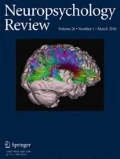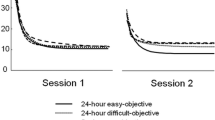Abstract
Cognitive enhancement strategies have gained recent popularity and have the potential to benefit clinical and non-clinical populations. As technology advances and the number of cognitively healthy adults seeking methods of improving or preserving cognitive functioning grows, the role of electronic (e.g., computer and video game based) cognitive training becomes more relevant and warrants greater scientific scrutiny. This paper serves as a critical review of empirical evaluations of publically available electronic cognitive training programs. Many studies have found that electronic training approaches result in significant improvements in trained cognitive tasks. Fewer studies have demonstrated improvements in untrained tasks within the trained cognitive domain, non-trained cognitive domains, or on measures of everyday function. Successful cognitive training programs will elicit effects that generalize to untrained, practical tasks for extended periods of time. Unfortunately, many studies of electronic cognitive training programs are hindered by methodological limitations such as lack of an adequate control group, long-term follow-up and ecologically valid outcome measures. Despite these limitations, evidence suggests that computerized cognitive training has the potential to positively impact one’s sense of social connectivity and self-efficacy.
Similar content being viewed by others
References
Achtman, R. L., Green, C. S., & Bavelier, D. (2008). Video games as a tool to train visual skills. Restorative Neurology and Neuroscience, 26(4–5), 435–446.
Ackerman, P. L., Kanfer, R., & Calderwood, C. (2010). Use it or lose it? Wii brain exercise practice and reading for domain knowledge. Psychology and Aging, 25(4), 753–766.
Ball, K., Berch, D. B., Helmers, K. F., Jobe, J. B., Leveck, M. D., Marsiske, M., et al. (2002). Effects of cognitive training interventions with older adults: a randomized controlled trial. Journal of the American Medical Association, 288(18), 2271–2281.
Barnes, D. E., Yaffe, K., Belfor, N., Jagust, W. J., DeCarli, C., Reed, B. R., et al. (2009). Computer-based cognitive training for mild cognitive impairment: results from a pilot randomized, controlled trial. Alzheimer’s Disease and Associated Disorders, 23(3), 205–210.
Basak, C., Boot, W. R., Voss, M. W., & Kramer, A. F. (2008). Can training in a real-time strategy video game attenuate cognitive decline in older adults? Psychology and Aging, 23(4), 765–777.
Bellucci, D. M., Glaberman, K., & Haslam, N. (2002). Computer-assisted cognitive rehabilitation reduces negative symptoms in the severely mentally ill. Schizophrenia Research, 59, 225–232.
Boot, W. R., Kramer, A. F., Simons, D. J., Fabiani, M., & Gratton, G. (2008). The effects of video game playing on attention, memory, and executive control. Acta Psychologica, 129, 387–398.
Boyle, E. M., Kennedy, A. M., Traynor, O., & Hill, D. K. (2011). Training surgical skills using non-surgical tasks - can nintendo wii improve surgical performance. Journal of Surgical Education, 68(2), 148–154.
Brehmer, Y., Westerberg, H., & Backman, L. (2012). Working-memory training in younger and older adults: training gains, transfer, and maintenance. Frontiers in Human Neuroscience, 6, 63.
Burda, P. C., Starkey, T. W., Dominguez, F., & Vera, V. (1994). Computer-assisted cognitive rehabilitation of chronic psychiatric patients. Computers in Human Behavior, 10(3), 359–368.
Burdea, G. C. (2003). Virtual rehabilitation–benefits and challenges. Methods of Information in Medicine, 42(5), 519–523.
Churchill, J. D., Galvez, R., Colcombe, S., Swain, R. A., Kramer, A. F., & Greenought, W. T. (2002). Exercise, experience, and the aging brain. Neurobiology of Aging, 23, 941–955.
Clarkson-Smith, L., & Hartley, A. A. (1990). The game of bridge as an exercise in working memory and reasoning. Journal of Gerontology, 45(6), P233–P238.
Draganski, B., Gaser, C., Busch, V., Schuierer, G., Bogdahn, U., & May, A. (2004). Neuroplasticity: changes in grey matter induced by training. Nature, 427, 311–312.
Dresler, M., Sandberg, A., Ohla, K., Bublitz, C., Trenado, C., Mroczko-Wasowicz, A., et al. (2013). Non-pharmacological cognitive enhancement. Neuropharmacology, 64(1), 529–543.
Edwards, J. D., Delahunt, P. B., & Mahncke, H. W. (2009). Cognitive speed of processing training delays driving cessation. The Journals of Gerontology. Series A, Biological Sciences and Medical Sciences, 64(12), 1262–1267.
Engvig, A., Fjell, A. M., Westlye, L. T., Moberget, T., Sundseth, O., Larsen, V. A., et al. (2010). Effects of memory training on cortical thickness in the elderly. NeuroImage, 52, 1667–1676.
Fabrigoule, C., Letenneur, L., Dartigues, J. F., Zarrouck, M., Commenges, D., & Barberger-Gateau, P. (1995). Social and leisure activities and risk of dementia: a prospective longitudinal study. Journal of the American Geriatrics Society, 43(5), 485–490.
Gates, N., & Valenzuela, M. (2010). Cognitive exercise and its role in cognitive function in older adults. Current Psychiatry Reports, 12(1), 20–27.
George, D. R., & Whitehouse, P. J. (2011). Marketplace of memory: what the brain fitness technology industry says about us and how we can do better. Gerontologist, 51(5), 590–596.
Goldstein, J., Cajko, L., Oosterbroek, M., Michielsen, M., van Houten, O., & Salverda, F. (1997). Video games and the elderly. Social Behavior and Personality, 25(4), 345–352.
Gopher, D., Weil, M., & Bareket, T. (1994). Transfer of skill from a computer game trainer to flight. Human Factors, 36(3), 387–405.
Hambrick, D. Z., Salthouse, T. A., & Meinz, E. J. (1999). Predictors of crossword puzzle proficiency and moderators of age-cognition relations. Journal of Experimental Psychology: General, 128(2), 131–164.
Hubert-Wallander, B., Green, C. S., Sugarman, M., & Bavelier, D. (2011). Changes in search rate but not in the dynamics of exogenous attention in action videogame players. Attention, Perception, & Psychophysics, 73(8), 2399–2412.
Jaeggi, S. M., Buschkuehl, M., Jonides, J., & Shah, P. (2011). Short- and long-term benefits of cognitive training. Proceedings of the National Academy of Sciences of the United States of America, 108(25), 10081–10086.
Jak, A. J. (2012). The impact of physical and mental activity on cognitive aging. Current Topics in Behavioral Neurosciences, 10, 273–291.
Johansson, B., & Tornmalm, M. (2012). Working memory training for patients with acquired brain injury: effects in daily life. Scandinavian Journal of Occupational Therapy, 19(2), 176–183.
Korczyn, A. D., & Aharonson, V. (2007). Computerized methods in the assessment and prediction of dementia. Current Alzheimer Research, 4, 364–369.
Kramer, A. F., Bherer, L., Colcombe, S. J., Dong, W., & Greenought, W. T. (2004). Environmental influences on cognitive and brain plasticity during aging. Journal of Gerontology: Medical Sciences, 59a(9), 940–957.
Kueider, A. M., Parisi, J. M., Gross, A. L., & Rebok, G. W. (2012). Computerized cognitive training with older adults: a systematic review. PLoS One, 7(7), e40588.
Lee, H., Boot, W. R., Basak, C., Voss, M. W., Prakash, R. S., Neider, M., et al. (2012). Performance gains from directed training do not transfer to untrained tasks. Acta Psychologica, 139, 146–158.
Lohman, D. F., Thorndike, R. L., Hagen, E., Smith, P., Fernandes, C., & Strand, S. (2001). Cognitive abilities test (3rd ed.). London: NFER Nelson.
Lundqvist, A., Grundstrom, K., Samuelsson, K., & Ronnberg, J. (2010). Computerized training of working memory in a group of patients suffering from acquired brain injury. Brain Injury, 24(11), 1173–1183.
Maguire, E. A., Spiers, H. J., Good, C. D., Hartly, T., Frackowiak, R., & Burgess, N. (2003). Navigation expertise and the human hippocampus: a structural brain imaging analysis. Hippocampus, 13, 250–259.
Mahncke, H. W., Connor, B. B., Appelman, J., Ahsanuddin, O. N., Hardy, J., Wood, R. A., et al. (2006). Memory enhancement in healthy older adults using a brain plasticity-based training program: a randomized, controlled study. PNAS, 103(33), 12523–12528.
McDougall, S., & House, B. (2012). Brain training in older adults: evidence of transfer to memory span performance and pseudo-Matthew effects. Neuropsychology, Development, and Cognition. Section B, Aging, Neuropsychology and Cognition, 19(1–2), 195–221.
Nouchi, R., Taki, Y., Takeuchi, H., Hashizume, H., Akitsuki, Y., Shigemune, Y., et al. (2012). Brain training game improves executive functions and processing speed in the elderly: a randomized controlled trial. PLoS One, 7(1), 1–9.
Owen, A. M., Hampshire, A., Grahn, J. A., Stenton, R., Dajani, S., Burns, A. S., et al. (2010). Putting brain training to the test. Nature, 465, 775–778.
Papp, K. V., Walsh, S. J., & Snyder, P. J. (2009). Immediate and delayed effects of cognitive interventions in healthy elderly: a review of current literature and future directions. Alzheimer's & Dementia, 5(1), 50–60.
Peretz, C., Korczyn, A. D., Shatil, E., Aharonson, V., Birnboim, S., & Giladi, N. (2011). Computer-based, personalized cognitive training versus classical computer games: a randomized double-blind prospective trial of cognitive stimulation. Neuroepidemiology, 36(2), 91–99.
Pillai, J. A., Hall, C. B., Dickson, D. W., Buschke, H., Lipton, R. B., & Verghese, J. (2011). Association of crossword puzzle participation with memory decline in persons who develop dementia. Journal of the International Neuropsychological Society, 17(6), 1006–1013.
Rabipour, S., & Raz, A. (2012). Training the brain: fact and fad in cognitive and behavioral remediation. Brain and Cognition, 79(2), 159–179.
Richardson, A. E., Powers, M. E., & Bousquet, L. G. (2011). Video game experience predicts virtual but not real navigation performance. Computers in Human Behavior, 27, 552–560.
Sandford, J. A., & Brown, R. J. (1988). Captain’s log cognitive system. Richmond: Braintrain.
Shatil, E., Metzer, A., Horvitz, O., & Miller, A. (2010). Home-based personalized cognitive training in MS patients: a study of adherence and cognitive performance. NeuroRehabilitation, 26, 143–153.
Smith, G. E., Housen, P., Yaffe, K., Ruff, R., Kennison, R. F., Mahncke, H. W., et al. (2009). A cognitive training program based on principles of brain plasticity: results from the Improvement in Memory with Plasticity-based Adaptive Cognitive Training (IMPACT) study. Journal of the American Geriatrics Society, 57(4), 594–603.
Strobach, T., Frensch, P. A., & Schubert, T. (2012). Video game practice optimizes executive control skills in dual-task and task switching situations. Acta Psychologica, 140, 13–24.
Tarnanas, I. (2000). A virtual environment for the assessment and the rehabilitation of the visuo-constructional ability in dementia patients. Studies in Health Technology and Informatics, 70, 341–343.
van Muijden, J., Band, G. P., & Hommel, B. (2012). Online games training aging brains: limited transfer to cognitive control functions. Frontiers in Human Neuroscience, 6, 221.
Verghese, J., Lipton, R. B., Katz, M. J., Hall, C., Derby, C. A., Kuslansky, G., et al. (2003). Leisure activities and the risk of dementia in the elderly. The New England Journal of Medicine, 348, 2508–2516.
Westerberg, H., Jacobaeus, H., Hirvikoski, T., Clevberger, P., Ostensson, M. L., Bartfai, A., et al. (2007). Computerized working memory training after stroke - A pilot study. Brain Injury, 21(1), 21–29.
Willis, S. L., Tennstedt, S. L., Marsiske, M., Ball, K., Elias, J., Koepke, K. M., et al. (2006). Long-term effects of cognitive training on everyday functional outcomes in older adults. Journal of the American Medical Association, 296(23), 2805–2814.
Wolinsky, F. D., Mahncke, H. W., Kosinski, M., Unverzagt, F. W., Smith, D. M., Jones, R. N. et al. (2009). The ACTIVE cognitive training trial and predicted medical expenditures. BMC Health Services Research, 9(109).
Zelinski, E. M. (2009). Far transfer in cognitive training of older adults. Restorative Neurology and Neuroscience, 27(5), 455–471.
Zelinski, E. M., Spina, L. M., Yaffe, K., Ruff, R., Kennison, R. F., Mahncke, H. W., et al. (2011). Improvement in memory with plasticity-based adaptive cognitive training: results of the 3-month follow-up. Journal of the American Geriatrics Society, 59(2), 258–265.
Author information
Authors and Affiliations
Corresponding author
Rights and permissions
About this article
Cite this article
Jak, A.J., Seelye, A.M. & Jurick, S.M. Crosswords to Computers: A Critical Review of Popular Approaches to Cognitive Enhancement. Neuropsychol Rev 23, 13–26 (2013). https://doi.org/10.1007/s11065-013-9226-5
Received:
Accepted:
Published:
Issue Date:
DOI: https://doi.org/10.1007/s11065-013-9226-5




